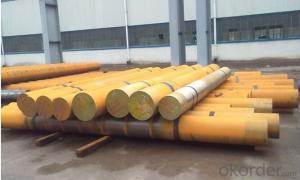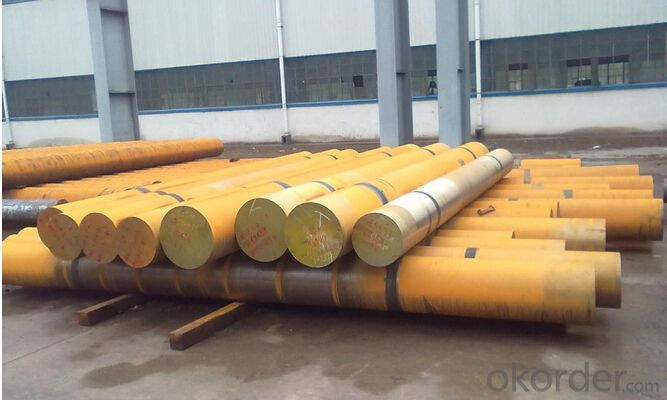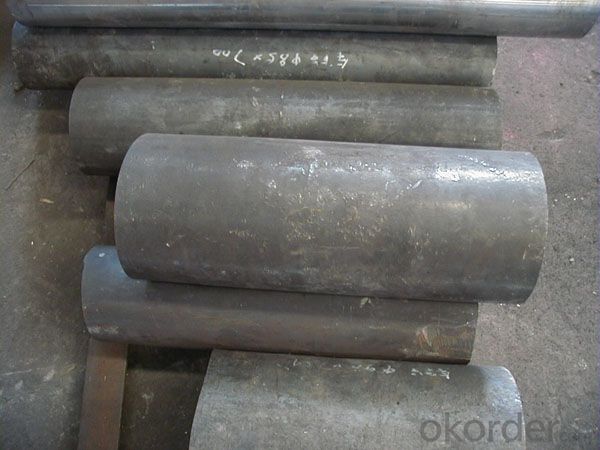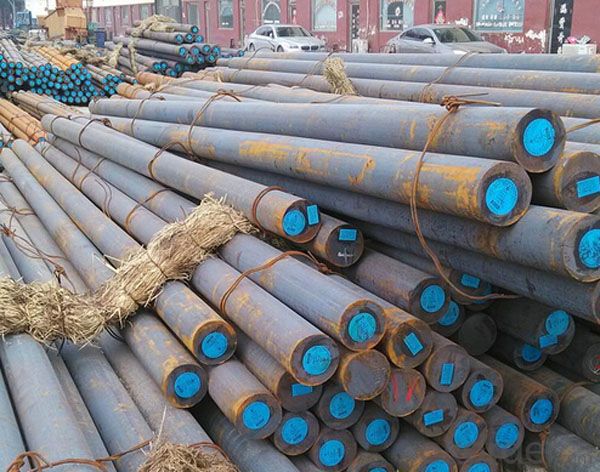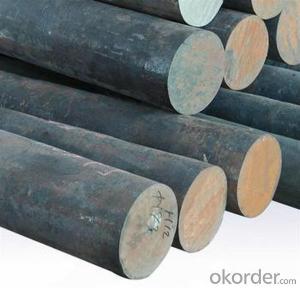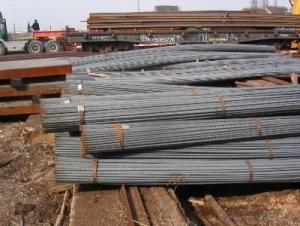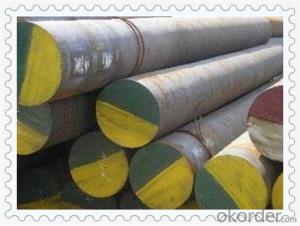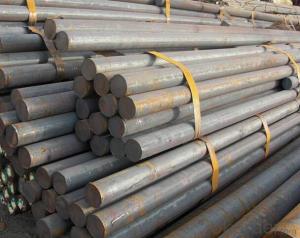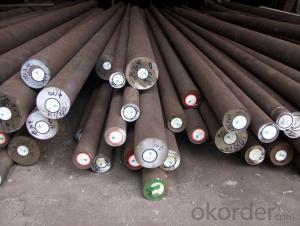Special Steel 4Cr13 Round Bar Steel Bar
- Loading Port:
- China main port
- Payment Terms:
- TT OR LC
- Min Order Qty:
- 30 m.t.
- Supply Capability:
- 10000 m.t./month
OKorder Service Pledge
OKorder Financial Service
You Might Also Like
Specification
Special Steel 4Cr13 Round Bar Steel Bar
Product Information:
Features :
1)high carbon and high chromium
2)high strength and polish performance
3)good abrasion resistance
4)good corrosion resistance
Applications :
For making all sorts of high load and high abrasion resisting plastic moulds and transparent moulds of plastic product on the action of corrosive medium.
Product Overviews:
| Product Name | Typical Grades | Diameter(mm) | Standard adopted |
| Carbon Steel | 20 (1020/S20C/C22) | Ø16-Ø300 | GB/SAE/JIS/DIN |
| 40 (1040/S40C/C40) | |||
| 45 (1045/S45C/C45) | |||
| Bearing Steel | GCr9 (51100/SUJ1) | Ø12-Ø250 | |
| GCr15 (52100/SUJ2/100Gr6) | |||
| GCr9SiMn (A485-Gr.1/SUJ3) | |||
| Cr-Mo Steel | 20Cr (5120/SCr420H/20Cr4) | Ø12-Ø250 | |
| 40Cr (5140/SCr440/41Cr4) | |||
| 42CrMo(4140/SCM440/42CrMo4) | |||
| Gear Steel | 20CrNiMo | Ø16-Ø600 | |
| 20CrMn(5115/SMnC420/20MnCr5) | |||
| 20CrNiMo(8620/SNCM220/20CrMiMo2) |
Product Show:

Our Advantages:
· Industry experience over 20 years.
· Shipment of goods -More than 70 countries worldwide.
· The most convenient transport and prompt delivery.
· Competitive price with best service.
· High technical production line with top quality products.
· High reputation based on best quality products.
With our experienced, enthusiastic and dynamic staffs, we assure to bring you the products with best quality, reasonable prices and good after-sales services under the motto: Friends First, Business After.
Communication, Experience, Expertise and Best efforts are our Promises to you.
- Q: What are the applications of special steel in the food processing industry?
- Special steel is widely used in the food processing industry due to its unique properties. It is utilized for manufacturing various equipment and components that require high strength, corrosion resistance, and hygiene standards. Some applications include the production of food processing machinery, cutting tools, knives, blades, and containers. Special steel ensures durability, cleanliness, and safety, making it an indispensable material in the food processing industry.
- Q: Can special steel be used in the automotive parts manufacturing industry?
- Yes, special steel can be used in the automotive parts manufacturing industry. Special steel offers high strength, durability, and resistance to corrosion, making it suitable for various automotive components such as engine parts, suspension systems, and body structures. Additionally, special steel can be tailored to meet specific requirements, allowing manufacturers to optimize performance and safety in automotive applications.
- Q: How is special steel used in the production of bearings?
- Special steel is used in the production of bearings due to its unique properties such as high durability, corrosion resistance, and wear resistance. It helps in increasing the lifespan and performance of bearings, allowing them to withstand high loads and rotational speeds. Additionally, the special steel used in bearings undergoes precise heat treatment and surface finishing processes to ensure optimal performance and reduce friction, resulting in smoother operations in various industries such as automotive, aerospace, and manufacturing.
- Q: How does heat treatment affect the properties of special steel?
- Heat treatment can significantly impact the properties of special steel. By subjecting the steel to controlled heating and cooling processes, the structure and composition of the steel can be altered, resulting in changes to its hardness, strength, toughness, and other mechanical properties. Heat treatment can also improve the steel's resistance to wear, corrosion, and fatigue, making it more suitable for specific applications.
- Q: How does stainless steel contribute to the automotive industry?
- Stainless steel contributes to the automotive industry by providing durability, corrosion resistance, and aesthetic appeal to various parts and components. It is commonly used in exhaust systems, engine components, body panels, and trim pieces, ensuring longevity and maintaining the integrity of vehicles even in harsh conditions.
- Q: What are the properties of high-temperature tool steel?
- High-temperature tool steel is known for its exceptional heat resistance, hardness, and wear resistance. It has the ability to retain its strength even at elevated temperatures, making it ideal for applications in high-temperature environments. Additionally, it exhibits excellent toughness, allowing it to withstand heavy loads and resist deformation. High-temperature tool steel also has good dimensional stability and can maintain its shape even under extreme conditions.
- Q: What are the factors that affect the machinability of special steel?
- The factors that affect the machinability of special steel include the composition and microstructure of the steel, hardness and strength of the material, cutting tool material and geometry, cutting speed and feed rate, coolant or lubrication used during machining, and the presence of any impurities or surface defects on the steel.
- Q: Can special steel be used in the production of surgical instruments?
- Yes, special steel, such as stainless steel or titanium alloys, can be used in the production of surgical instruments. These materials offer excellent corrosion resistance, durability, and biocompatibility, making them suitable for surgical applications that require high precision and sterility.
- Q: Can special steel be used in the manufacturing of sports equipment?
- Yes, special steel can be used in the manufacturing of sports equipment. Special steel refers to a type of steel that has been specifically designed and engineered to possess certain characteristics and properties that make it suitable for various specialized applications. These characteristics can include high strength, durability, resistance to corrosion and wear, and the ability to withstand extreme conditions. In the manufacturing of sports equipment, special steel can be used in a variety of ways. For example, it can be utilized to create the shafts of golf clubs or tennis rackets, where its high strength and stiffness are crucial for optimal performance. Special steel can also be used in the construction of sports equipment such as bicycles, where its lightweight yet strong properties are highly desirable. Additionally, special steel can be employed in the manufacturing of sports equipment accessories, such as hooks, buckles, or fasteners. These components often require high tensile strength and corrosion resistance, and special steel can provide these properties, ensuring the longevity and reliability of the equipment. In summary, special steel can indeed be used in the manufacturing of sports equipment, thanks to its unique properties that enhance performance, durability, and overall quality.
- Q: What are the future trends and innovations expected in special steel production?
- In the future, several trends and innovations are expected to shape the special steel production industry. Here are a few key areas where advancements are likely to occur: 1. Advanced Manufacturing Techniques: Special steel manufacturers are likely to adopt advanced manufacturing techniques such as additive manufacturing (3D printing) and digitalization. These technologies will facilitate the production of complex geometries, reduce waste, and enable customization of special steel products. 2. Sustainable Production: As environmental concerns continue to grow, there will be a focus on sustainable production methods in the special steel industry. This includes the adoption of energy-efficient processes, recycling and reusing materials, and minimizing the carbon footprint of steel production. 3. High-Strength and Lightweight Alloys: With the increasing demand for lightweight materials in various sectors like automotive and aerospace, special steel production is expected to focus on developing high-strength and lightweight alloys. These alloys will offer improved performance while reducing the weight of components, leading to fuel efficiency and enhanced sustainability. 4. Nanotechnology and Microstructural Engineering: Nanotechnology and microstructural engineering will play a significant role in enhancing the properties of special steels. By manipulating the material at the nanoscale, manufacturers can improve strength, toughness, corrosion resistance, and other characteristics. 5. Enhanced Surface Treatments: Advances in surface treatments, such as coatings, will contribute to the performance and longevity of special steel products. Innovative surface treatments will provide increased resistance to wear, corrosion, and heat, expanding the range of applications for special steels. 6. Digitalization and Data Analytics: The integration of digital technologies and data analytics will revolutionize special steel production. Smart factories with interconnected systems will enable real-time monitoring, predictive maintenance, and improved quality control, resulting in higher productivity and efficiency. 7. Automation and Robotics: Automation and robotics will continue to play a vital role in special steel production. Automated processes will optimize productivity, reduce human errors, and improve worker safety, thereby enhancing overall operational efficiency. 8. Industry 4.0 Integration: The special steel industry is expected to embrace Industry 4.0 principles, such as the Internet of Things (IoT) and artificial intelligence (AI). These technologies will enable seamless connectivity, intelligent decision-making, and predictive analysis, leading to improved productivity, cost-effectiveness, and competitiveness. Overall, the future of special steel production is likely to be driven by advancements in manufacturing techniques, sustainable practices, material engineering, digitalization, and automation. These innovations will not only enhance the performance and quality of special steel products but also contribute to a more sustainable and efficient industry.
Send your message to us
Special Steel 4Cr13 Round Bar Steel Bar
- Loading Port:
- China main port
- Payment Terms:
- TT OR LC
- Min Order Qty:
- 30 m.t.
- Supply Capability:
- 10000 m.t./month
OKorder Service Pledge
OKorder Financial Service
Similar products
Hot products
Hot Searches
Related keywords
